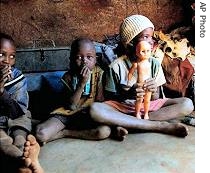2006年VOA标准英语-Forced Evictions in Africa Increasing(在线收听)
By Lisa Schlein
Geneva
03 October 2006
 Unidentified children of farm laborers, who faces eviction, inside their home near Messina, South Africa, in February 2005 |
||
--------
The report calls forced evictions one of the most widespread and unrecognized human-rights violations in Africa.
The acting coordinator of the Center on Housing Rights and Evictions, Deanna Fowler, tells VOA governments throughout Africa continue to forcibly evict hundreds of thousands of people from their homes each year. In the majority of cases, she says, inhabitants are not given any notice that they are about to be thrown out of their homes.
"They just wake up and there are bulldozers and soldiers waiting outside their homes with guns asking them to move. And, they are not able to gather their property and if they did have some legal title, sometimes the papers for that are lost in the destruction," she said. "There is often violence that involves people being shot at with rubber bullets or with live ammunition. People have been killed. There have been instances where pregnant women go into premature labor and lose their children."
The report says many African governments justify forced evictions on the grounds they are essential for development and in the interest of the general public good. But it says the evictions are counterproductive because they create homelessness, destroy property and productive assets and rob people of their livelihoods.
The report says the government of Zimbabwe is a case in point. In 2005, Zimbabwe forced an estimated 700,000 people from their homes and businesses. It says virtually nothing has been done since then to address the plight of the displaced, most of whom remain homeless and without work.
Zimbabwe is regarded as one of the main violators of housing rights in the world. But Fowler says it may not be the worst.
"I would say that Nigeria is one of the worst violators in the world right now," she added. "Since 2000, there have been an estimated two million people forcibly evicted."
According to Fowler, the Nigerian government says recent large-scale evictions in the country's capital, Abuja, are needed to carry out its urban development program.
"They argue that houses have been built illegally in the wrong places or have been built without following adequate standards and so they are dangerous," continued Fowler. "But, in the process of trying to make the city a very safe and well-planned area, they are creating homelessness that has reached almost a million people. It has worsened the crisis in unemployment and in housing and in food security."
The report also accuses Sudan of having forcibly evicted thousands of victims of conflict from camps for internally displaced people and resettling them in desert areas without access to clean water, food and other essentials.
The Center On Housing Rights And Evictions is equally critical of several other countries it ranks in the category of worst violators, including Angola, Kenya, Ghana and Equatorial Guinea.